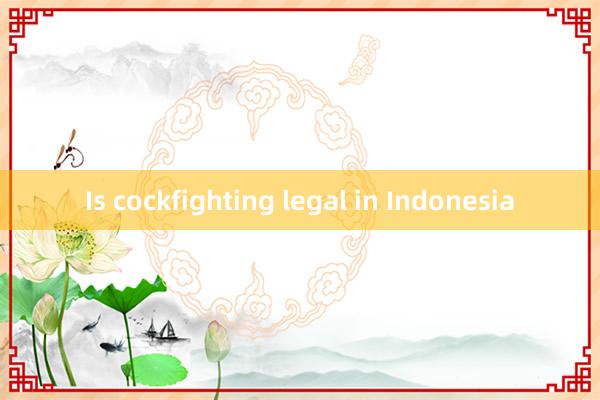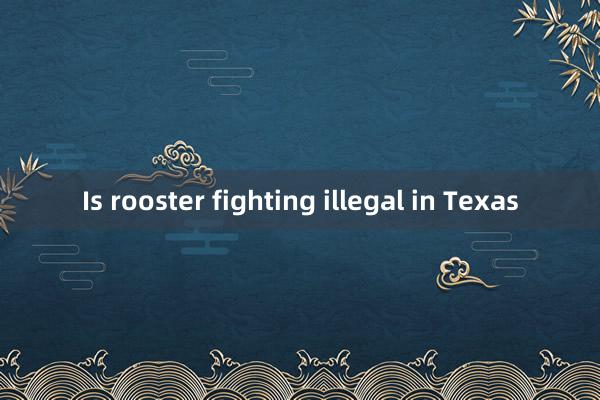Is cockfighting legal in Indonesia

Is Cockfighting Legal in Indonesia?
Cockfighting is a controversial practice found in many parts of the world, including Indonesia. It involves two roosters, often specially bred for aggression, fighting each other, typically to the death, while spectators place bets on the outcome. The practice has a long history in various cultures, including Indonesia, where it holds cultural and traditional significance in certain regions. However, the legal status of cockfighting in Indonesia is complex and often misunderstood.
Historical and Cultural Significance of Cockfighting in Indonesia
Cockfighting, known locally as sabungan ayam, has deep cultural roots in Indonesia, particularly in Bali, Java, and other parts of the country. In these areas, cockfighting is more than just a form of entertainment or gambling. It is intertwined with traditional ceremonies, rituals, and community gatherings. For instance, in Balinese Hinduism, cockfights are an integral part of certain religious rituals, particularly in offerings to the gods, known as tabuh rah. In these instances, cockfighting is not just about betting; it is a religious act that has been practiced for generations.
In rural communities, go88 tài xỉu cockfighting often serves as a social event where villagers come together. It can be seen as a symbol of masculinity, phim rule 34 honor,chich69 and social status, with the owner of the winning rooster gaining respect within the community. However, these cultural justifications do not necessarily align with Indonesia's legal framework, which has evolved over time.
Legal Status of Cockfighting in Indonesia
Under Indonesian law, cockfighting is generally considered illegal due to the association with gambling. Gambling, in most forms, is prohibited under Indonesian law, specifically in Law No. 7/1974 on Gambling Control. The law makes it clear that participating in or organizing gambling activities is a criminal offense, punishable by fines or imprisonment. Since cockfighting often involves betting, it typically falls under this prohibition.
However, the enforcement of these laws can vary widely depending on the region and the context of the cockfight. In more urbanized areas or places where the central government has more direct control, cockfighting events are more likely to be shut down, and participants could face legal consequences. On the other hand, in rural areas or places where cockfighting is deeply entrenched in local culture, law enforcement may turn a blind eye or take a more lenient approach.
Moreover, when cockfighting is part of a religious or cultural ritual, like in Bali’s tabuh rah, local authorities may allow it under the condition that no gambling takes place. This creates a legal gray area where cockfighting can be considered lawful if it is part of a traditional ceremony, but illegal if it involves betting.
go88 bị sậpModern Criticism and Animal Welfare Concerns
In recent years, cockfighting has come under increasing scrutiny, both from within Indonesia and internationally. Animal rights organizations argue that cockfighting is a cruel and inhumane practice. Roosters are often equipped with sharp blades or spurs attached to their legs, leading to brutal fights that frequently result in severe injury or death for one or both birds. This has raised concerns about animal welfare, with some groups calling for a nationwide ban on the practice, regardless of its cultural significance.
Public opinion in Indonesia is divided on the issue. While many people, particularly in rural areas, see cockfighting as a time-honored tradition, younger generations and urban populations are more likely to view it as outdated and cruel. As Indonesia modernizes and more attention is paid to issues like animal welfare, there is growing pressure on the government to crack down on cockfighting, even in regions where it holds cultural importance.
Government Response and Future Outlook
The Indonesian government has been somewhat cautious in addressing cockfighting due to its cultural sensitivity. Officials understand the cultural and religious dimensions of cockfighting in some areas, particularly in Bali, and have been reluctant to impose a blanket ban that could lead to unrest or conflict with local communities. However, in other regions, particularly in major cities, there has been a stronger push to enforce the laws against gambling and animal cruelty.
There have been discussions about introducing stricter regulations to prevent cockfighting that involves betting, while still allowing the practice in a cultural or religious context without gambling. Such a compromise could help balance the competing interests of preserving tradition and respecting animal rights.
Conclusion
Cockfighting in Indonesia occupies a complex space at the intersection of culture, religion, and law. While generally illegal due to its association with gambling, it is tolerated in certain areas where it holds cultural or religious significance. However, as societal attitudes shift and animal welfare concerns grow, the future of cockfighting in Indonesia remains uncertain. The challenge for the Indonesian government is to find a solution that respects both tradition and modern values, ensuring that laws are enforced while considering the unique cultural landscape of the country.
jili.comwww.heavenlybodice.com






